- Home
- Franklin Horton
Switched On: Book Six in The Borrowed World Series
Switched On: Book Six in The Borrowed World Series Read online
Copyright © 2018 by Franklin Horton
Cover by Deranged Doctor Design
Editing by Felicia Sullivan
All rights reserved.
No part of this book may be reproduced in any form or by any electronic or mechanical means, including information storage and retrieval systems, without written permission from the author, except for the use of brief quotations in a book review.
Created with Vellum
CONTENTS
Prologue
Chapter 1
Chapter 2
Chapter 3
Chapter 4
Chapter 5
Chapter 6
Chapter 7
Chapter 8
Chapter 9
Chapter 10
Chapter 11
Chapter 12
Chapter 13
Chapter 14
Chapter 15
Chapter 16
Chapter 17
Chapter 18
Chapter 19
Chapter 20
Chapter 21
Chapter 22
Chapter 23
Chapter 24
Chapter 25
Chapter 26
Chapter 27
Chapter 28
Chapter 29
Chapter 30
Chapter 31
Chapter 32
About the Author
Also by Franklin Horton
Bonus Content
Random Acts
PROLOGUE
For Jim Powell, the collapse began on a routine business trip. Jim's job at a local government agency required frequent travel from his home in southwestern Virginia to the state capital in Richmond, a distance of several hundred miles. He’d made this trip twice a month for over a decade without a hitch. Then the country was hit with a devastating coordinated terror attack.
Terrorists hit infrastructure targets around the country causing disruption and chaos. Most of the attacks were not mass casualty events but they ended life as Americans were accustomed to living it. Within hours the grid collapsed, followed eventually by cellular connectivity. Like Americans saw in natural disasters, such as hurricanes Katrina and Sandy, looting began immediately.
Jim and his group of coworkers were not friends. Some were not even on friendly terms, so there was some disagreement on how to proceed. Jim made it clear that he was heading for home immediately, with or without them. There was a vote and the group decided to leave, though there was still tension.
On the trip home they encountered lawlessness, struggling drug addicts, and a government response fully unprepared for the scale of the events unfolding. As millions of travelers were stranded on the highways FEMA established emergency camps, but were ultimately unable to support them in the long term. Eventually, people who went there seeking shelter realized there was no plan for getting them home. Many struck out on their own but had lost critical days thinking the government was going to fix this for them.
Jim Powell had no such delusion. Although he was what some people referred to as a prepper, Jim didn't see himself that way. He was from the Appalachian, or hillbilly, part of the state. He came from a line of people who had weathered economic hardship and deprivation. They believed in taking care of themselves and their families with little regard for the way outsiders and the government conducted their business. It was the way he had been raised.
Jim had long suspected there would be a collapse of some type and had prepared his family. They knew how to run the home in his absence. He left them well-equipped with guns, ammunition, and a long-term supply of food and water. While they did not live a fully sustainable lifestyle, raising all of their own food, they did live in the country with access to clean water and property for growing food.
Jim's trek home was not an easy one. They lost a member of their group in the chaos that soon ensued. Eventually, the group split in half over a disagreement on the best way to get home. Jim, his friend Gary, and his coworker Randi set out on their own. Alice and Rebecca chose the FEMA route, trusting that the government would house them in a camp, then bus them home. It did not work out as promised. Alice would eventually make it home but Rebecca did not, dying at the hands of a mentally-ill traveler named Boyd.
After a brutal struggle to get home, Jim found his family engaged in a conflict with desperate neighbors who saw no problem with stealing from those who had resources they did not. While Jim had to kill on his journey, so did his wife at home. Even his young son was not spared from pulling the trigger on a neighbor.
He had no time to appreciate being home, finding himself immediately embroiled in the chaos of having to rescue his mother and son from neighbors who had taken them. When he resolved that, again having to kill, he hoped the worst was over. He was home now. He and his family were together. They could hunker down, bury their heads, and weather the hard times.
If only it were so easy.
No one in Jim's original group found their return home to be as idyllic as expected. While Jim tried to get settled back into life in his valley, his friend and traveling companion Gary was dealing with his own issues in the town where he lived. Gary was also prepared for hard times, though the location where his family built their home was not defensible. Living on the edge of a densely-populated town, they were vulnerable to attack.
When Gary communicated with Jim and found that there were empty homes in the secluded valley where Jim lived, Gary made the tough call to pack up his family and leave their home. He was not able to do so before he lost a son-in-law in a violent episode that left Gary's daughter depressed and catatonic. In their rattled state, they made the journey and moved into an empty house not far from Jim’s.
Randi lived with her two daughters and her grandchildren miles from any town. They lived near her father's farm, a thirty minute drive from Jim's house. Randi's family could have survived indefinitely on the resources of their farm and the knowledge in the heads of her parents. Instead, they fell victim to a long-standing feud that boiled over with a neighboring family. One bad decision by Randi’s brother led to a vicious outpouring of violence that resulted in Randi’s parents being murdered and her family home burned to the ground. Despite her earlier assurance to Jim that she would be fine, she ultimately took Jim up on his offer to join him in the valley where he lived.
Inevitably, those things that made Jim's valley attractive to him also made it attractive to outsiders looking for a place to weather the storm. Several times Jim, his neighbors, and his friends found themselves fighting off outsiders intent on stealing their homes and their resources. With each encounter Jim was finding diplomacy had little place in this new world. Discussion only seemed to buy you time until the guns came out.
He struggled to keep his family and friends safe, but he also struggled with an underlying guilt because there had been times when he’d wished for this—that the world would reset, that the government would collapse and reveal itself for the fraud he knew it was.
The thing he had not bargained for, the thing he had not anticipated, was how much violence, heartache, and hardship would come with the collapse. He was tired of killing and tired of seeing people he knew die.
Most recently, his coworker Alice, with whom he had a difficult relationship during their working career, had decided to come join them in the valley. She'd lost her husband and her mother. She saw the valley as a way to provide her son with greater protection.
She did not even have the opportunity to settle in before she got herself killed helping save Jim's life. For Jim, that was just new guilt on top of the old.
Jim didn't know what he was going to do.
He did not want to be in charge but found himself as the de facto leader of this group more often than not. He just wanted to be left alone, but it had been easier to hide in the world before the collapse. Now, those that hid would find all that they worked to preserve stolen from under their noses.
Could Jim continue to shun responsibility or was it time to step forward? Was it time to own the blood he’d spilled?
1
Three Months Earlier
THE COAL-FIRED POWER plant at Carbo, Virginia, had never looked so desolate in its seventy year history. Until the world stumbled, the power plant was constantly busy. There were coal cars delivering fuel, operators monitoring gauges and switchgear, and heavy equipment zipping around. Sitting idle now for months, the facility was covered with a fine layer of gritty fly ash, oily coal dust, and soot. Perhaps that patina would never go away.
Cecil Hughes had worked at the plant for nearly forty years, the last thirty of those years in the machine shop. The machine shop was a medium-sized steel building, roughly the size of a fast food restaurant. Its outer skin was pea green metal of the type often found on industrial buildings in coal country. The inside of the steel structure had thick insulation that was covered in seventy years of dust and grime.
The building had that particular character that only old shops have. The floor was oil-stained and worn smooth by many decades of boots. The walls were lined with vintage lathes, milling machines, drill presses, and racks of metal stock. The smell of cutting oil still hung in the air despite the fact that no machining operations had taken place in months. This was Cecil’s domain. He was the shop foreman and most of his waking hours for the last thirty years had been spent in this windowless, poorly-lit building.
Cecil worked at the plant up until the day they sent him home. The plant was still able to produce power but it was no longer able to get that power where it was needed. After the grid was damaged in the initial attacks, no one followed the urgent plea to throttle back their power usage. Washington, D.C. and Northern Virginia wanted more power, and plants tried to make that happen. The cost was that components were fried trying to meet demand. With the roads blocked by disabled vehicles and fuel becoming difficult to obtain, the power companies couldn't dispatch workers to replace the substation and power transmission components. So the operators at the Carbo plant did something they rarely did; they let all the fires in the boilers burn out. Coal suppliers had already warned them they were experiencing difficulty getting fuel, so the shutdown was inevitable.
Cecil lived in a nearby hollow. A lot of his family lived close by on his property. Both his son and his daughter had mobile homes in the same hollow and Cecil enjoyed that. It kept his grandchildren close by so that he could be a part of their daily lives. Cecil’s mother was still living and she lived in the family’s old home place at the mouth of the hollow. Cecil had grown up poor, so he was not as concerned as some might have been when the power went out. He knew how to get by with very little but his children and grandchildren did not.
When the weather got cold, they had trouble heating their homes because they had not followed Cecil’s advice to install a woodstove in their homes for backup heat. They didn’t want the mess, didn’t want to cut firewood. They all ended up at Cecil’s home, where he had a woodstove, but it was less than ideal. His mobile home was overcrowded to the point of misery.
Desperate for options, Cecil decided to move them all to the machine shop. It was basically his second home anyway. He had keys to get through the gates and into the shop. The machine shop also had an enormous coal stove and while there was not enough coal stockpiled to keep the power plant itself going indefinitely, there was more than enough coal lying around to keep that coal stove going for several winters. Over the course of several days, Cecil's wife, mother, kids, and their families moved into the shop, taking beds, cots, sleeping bags, and everything else that mattered to them.
When the weather permitted, they fished the river for largemouth and smallmouth bass, catfish, pike, muskie, and even alligator gar. They trapped turtles and beavers, and hunted the slopes around the plant for deer, possum, rabbits, coons, and black bear. Cecil's wife always grew a big garden and she brought her canning and cellar vegetables with her. While the family wasn’t thriving, they weren’t starving either. They were already planning on a much bigger garden the following summer and had been stockpiling seeds.
It was not quite winter yet but fall was on the way out. The nights and mornings were getting colder. Soon winter would be fully upon them. There was a lot of variation in how severe central Appalachian winters could be. Some were mild but others were utterly arctic in nature. Cecil wondered what this winter would bring. He hoped he was ready.
On one particular morning, he was the first to wake. He lit a Coleman lantern and shook the ash and clinkers from the stove grate, then added more coal. The shop would be warm for his family when they woke up. He never slept well anymore. He worried too much. His bladder was also determined to wake him up early each day.
From within the windowless shop, Cecil and his family had no way to know that an eight-man team was converging on their location. The team of top tier operators were led by a civilian known simply as Boss. Despite his lack of rank, he was as armed and lethal as any of his team members. Perhaps he was even more lethal since he lacked the discipline and structure a military background might have instilled in him. Yet his team had all seen him in action and had forged a bond of trust despite the difference in their backgrounds. They all trusted him.
Boss also had a special position of trust with the group currently running the government. Although he was separated from their most powerful placeholders by several layers of insulation, everyone knew his name and they knew his work. A certain level of government official knew there were jobs only Boss was perfectly suited for, and this particular assignment was one of them. He had been hand-selected. He had been briefed by someone near the top and had anything he required at his disposal. In this period of deprivation and scarcity, he had choppers, fuel, rations, ammunition, and anything he asked for.
Boss’s team wore mil-spec uniforms in a Realtree camo pattern that blended perfectly with the Appalachian terrain. Except for a designated marksman, all of the men carried suppressed bullpup rifles and .45 caliber Sig 227 pistols. There were no rules of engagement for this operation. Whatever Boss asked, they had clearance to do. If they left a wide trail of bodies and debris, no one cared.
As long as they succeeded.
The team watched the machine shop for an hour. Their intel, derived from the most powerful satellite images available, told them there was a small force residing here. Perhaps a dozen folks. Those satellite images placed most of them in the machine shop, but Boss took nothing for granted. After watching the facility, after seeing that smoke only rose from the chimney at the machine shop, he was more comfortable in accepting that this entire facility was abandoned except for those folks living in the shop. That made now as good a time as any to make their move.
“I want Group Two on overwatch. Group One will breach,” Boss said. The team wore wireless throat mikes and earpieces. It was state of the art, with encryption that left him with no concerns anyone would overhear their conversations.
The two group leaders confirmed their instructions and Boss raised his binoculars to watch what unfolded. He was pretty certain he knew how this would turn out, but you never knew how crazy hillbillies would act. He’d worked with a few over the years and they could be full of bluster or they could cut you. You never knew which one you were getting.
The breaching team approached the machine shop, taking advantage of the clutter around the property to conceal themselves. They flattened out against other structures, against rusting front-end loaders, and run-down forklifts. The lead man carried a battering ram.
They were perhaps ten seconds from piling into the structure when Boss’s urgent warning came across their earpieces. “Group One! Take cover! Take cover!”
>
Each man in the entry team took cover where he could find it, hoping his camo did its job. The entry door to the machine shop had just opened and a man emerged in partially-laced boots with his hair sticking out in all directions. He’d obviously just woken up and he did not appear to have a weapon.
"Hold steady. See what he’s up to,” Boss instructed.
Everyone on the team remained in their cover, not moving a muscle, even their respiration slowing to the bare minimum. The man who’d come from the shop staggered over to a pickup truck and yanked down his zipper. He threw back his head and peed on the tire like a dog who’d been stuck in the car for a long road trip.
“Have I got someone near this guy? Give me some clicks.”
There were two distinct clicks, their signal for an affirmative response.
“Okay. Whoever responded, take the whizzer out. Use a blade,” Boss instructed.
There was no hesitation. Immediately, a figure rose from near invisibility at the front of a forklift. In a fluid movement, he was on the peeing man, clamping his gloved left hand over his mouth and drawing his head back to expose the neck. With his right, he unsheathed a custom Bowie from its holster behind his Sig. It was a single, flawless movement that came faster than the blink of an eye—covering the mouth, jacking the head back, and slicing completely through the subclavian artery as easily as if he were gutting a fish.
Cutting the throat was never as efficient as they made it in the movies. It was not an instant death. The first reaction was a wet, drowning cough as blood ran down the exposed windpipe of the still living body. That provoked a cough reaction, which sprayed the blood from the wound. From there it was a race as to what was going to kill you faster, the blood loss or the blood filling the lungs, drowning you.
Boss witnessed the whole thing, pleased with the cool efficiency of the kill. "Good job, T.J. Group One move forward. Prepare to breach. And check that damn door. No sense using a battering ram if you don't need to."
T.J. moved to the door and twisted the handle. It was indeed unlocked. He raised a high thumbs up, hoping everyone on the team caught the gesture.

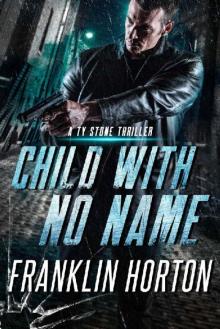 Child With No Name
Child With No Name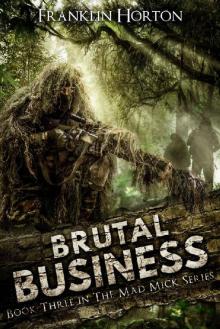 Brutal Business: Book Three in the Mad Mick Series
Brutal Business: Book Three in the Mad Mick Series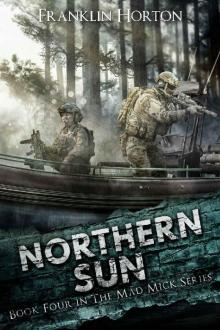 Northern Sun: Book Four in The Mad Mick Series
Northern Sun: Book Four in The Mad Mick Series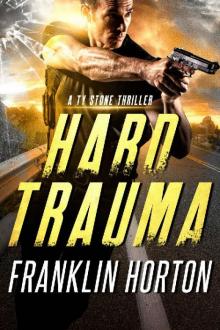 Hard Trauma
Hard Trauma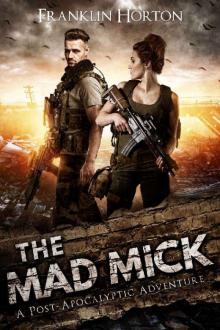 The Mad Mick: Book One of The Mad Mick Series
The Mad Mick: Book One of The Mad Mick Series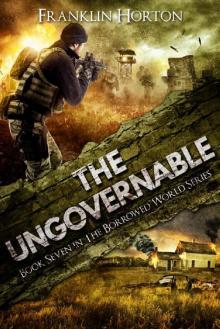 The Ungovernable
The Ungovernable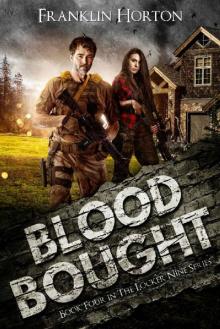 Blood Bought: Book Four in The Locker Nine Series
Blood Bought: Book Four in The Locker Nine Series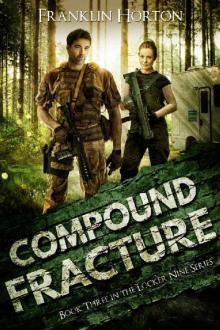 Compound Fracture
Compound Fracture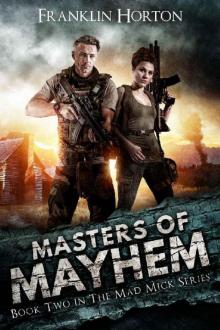 Masters of Mayhem
Masters of Mayhem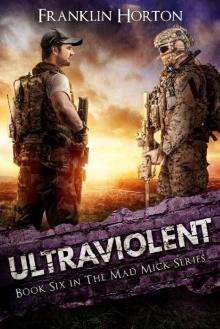 Ultraviolent: Book Six in The Mad Mick Series
Ultraviolent: Book Six in The Mad Mick Series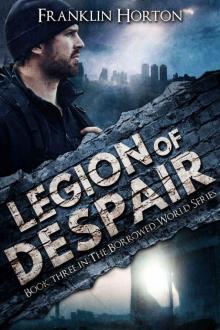 The Borrowed World (Book 3): Legion of Despair
The Borrowed World (Book 3): Legion of Despair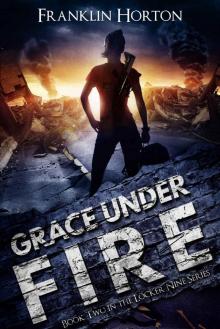 Grace Under Fire: Book Two In The Locker Nine Series
Grace Under Fire: Book Two In The Locker Nine Series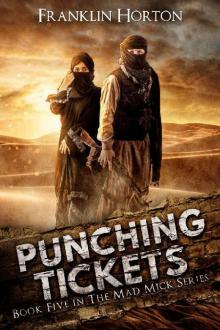 Punching Tickets: Book Five in The Mad Mick Series
Punching Tickets: Book Five in The Mad Mick Series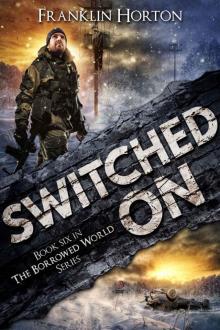 Switched On: Book Six in The Borrowed World Series
Switched On: Book Six in The Borrowed World Series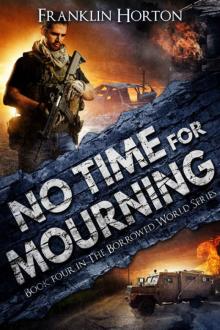 No Time For Mourning: Book Four in The Borrowed World Series
No Time For Mourning: Book Four in The Borrowed World Series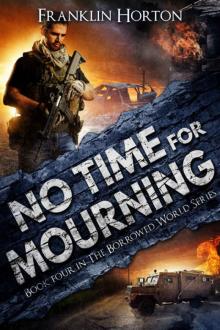 The Borrowed World (Book 4): No Time For Mourning
The Borrowed World (Book 4): No Time For Mourning Random Acts
Random Acts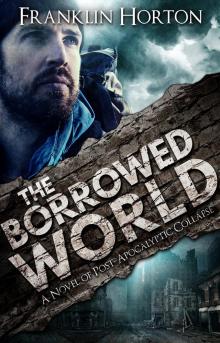 The Borrowed World: A Novel of Post-Apocalyptic Collapse
The Borrowed World: A Novel of Post-Apocalyptic Collapse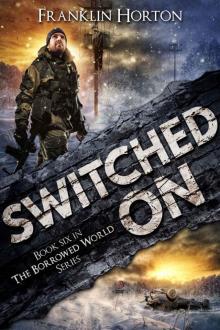 Switched On
Switched On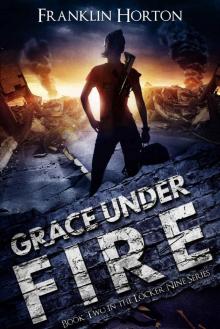 Grace Under Fire
Grace Under Fire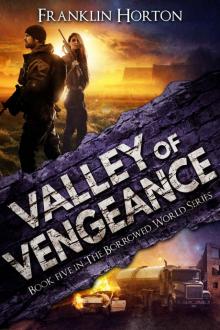 Valley of Vengeance: Book Five in The Borrowed World Series
Valley of Vengeance: Book Five in The Borrowed World Series